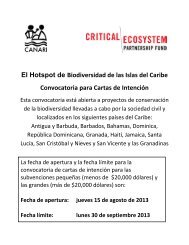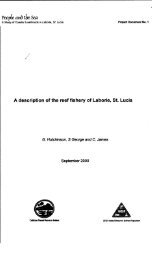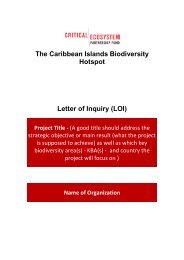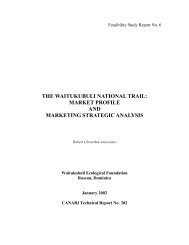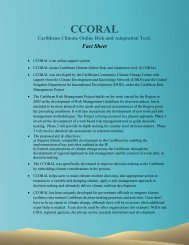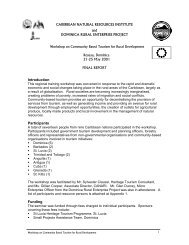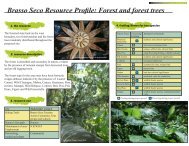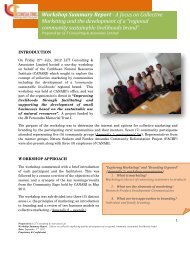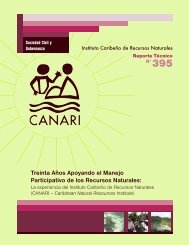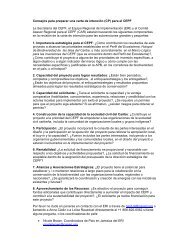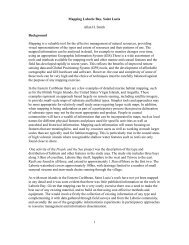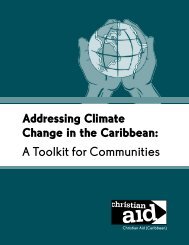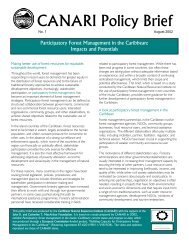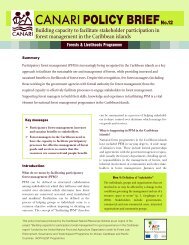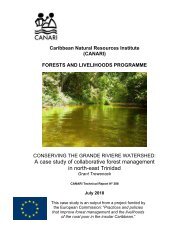Case study from Laborie Saint Lucia - CANARI
Case study from Laborie Saint Lucia - CANARI
Case study from Laborie Saint Lucia - CANARI
You also want an ePaper? Increase the reach of your titles
YUMPU automatically turns print PDFs into web optimized ePapers that Google loves.
Barbuda, Barbados, Cuba, Dominica, the<br />
Dominican Republic, Guadeloupe, French<br />
Guiana, Haiti, Jamaica, Martinique, <strong>Saint</strong> <strong>Lucia</strong>,<br />
and Trinidad and Tobago, and with guests <strong>from</strong><br />
Africa.<br />
While the Festival is indeed above all a cultural<br />
event, it is also an instrument of community<br />
development, as community festivals are also<br />
good for the local economy. In the past few<br />
years, for example, two surveys of local vendors<br />
have been carried out in the South of the island,<br />
and they have both indicated that vendors <strong>from</strong><br />
<strong>Laborie</strong> place Jazz in the South as their most<br />
important activity in terms of revenue. And it is<br />
not only the vendors who benefit, especially<br />
since Labowi Promotions ensures that all the<br />
services needed are provided locally when<br />
available. An event like Jazz in the South<br />
therefore means business opportunities for<br />
vendors, but it also means additional income for<br />
taxi drivers, restaurants, caterers and hotels in<br />
the area, and many others.<br />
At a broader level, Jazz in the South contributes<br />
to the community’s efforts to promote itself as<br />
a heritage tourism destination by creating<br />
opportunities for relaxed interaction between<br />
local people and visitors; promoting local<br />
cuisine, food products and crafts; and<br />
showcasing traditional <strong>Saint</strong> <strong>Lucia</strong>n village life<br />
and culture.<br />
Other features of Jazz in the South that may be<br />
relevant to a green economy agenda include:<br />
• efforts to minimise environmental impacts;<br />
• the facilitation of original collaborations and<br />
projects between musicians <strong>from</strong> different<br />
parts of the Caribbean region and the<br />
diasporas;<br />
• the provision of public relations and<br />
marketing support to musicians;<br />
• support in 2013 to an original Jazz and<br />
Enacted Word project on the topic of<br />
environment and climate change;<br />
• dissemination of environmental messages<br />
at mass events.<br />
Development issues in <strong>Laborie</strong><br />
Despite this picture of a culturally and socially<br />
vibrant community supported by strong local<br />
institutions, <strong>Laborie</strong> has been affected badly by<br />
larger economic forces over the last few years,<br />
particularly the end of a preferential market for<br />
bananas and the enduring global recession.<br />
Employment opportunities are limited to a few<br />
small businesses and industries in the area.<br />
Many residents work in other towns, some<br />
commuting long distances to the north of the<br />
island. There is a general recognition amongst<br />
all residents that the local economy needs to be<br />
transformed, to create the conditions to attract<br />
and sustain more initiatives like Jazz in the<br />
South. The Foundation believes that tourism<br />
based on the uniqueness and quality of the<br />
community’s cultural and natural assets can<br />
drive such a transformation. The key<br />
characteristics of the community’s current<br />
development vision include:<br />
• local ownership and use of local economic,<br />
environmental and cultural assets;<br />
• local products that are authentic and<br />
vibrant, and that present a unique<br />
experience;<br />
• benefits to the whole community;<br />
• locally available (and largely locally owned)<br />
accommodation;<br />
• competitiveness;<br />
• attention to quality and standards.<br />
In pursuit of this vision, the Foundation has<br />
worked to develop a calendar of local events<br />
and a community folk band. Work has also<br />
been ongoing on the development of a local<br />
bed and breakfast accommodation sector, a<br />
necessary component for increased benefits of<br />
the tourism product.<br />
Challenges and questions for further action<br />
research<br />
The Foundation’s diagnostic of challenges<br />
identifies the following issues:<br />
• developing an effective and credible<br />
4



